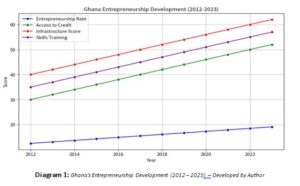The transformative power of entrepreneurship education is evident in the story of Rohit Okhera, a once-struggling vendor in India who became a thriving business owner after enrolling in an entrepreneurship education programme. Rohit’s story is a testament to the potential of entrepreneurship education to spur individual growth and economic development. But could a similar transformation occur in Ghana, a country with one of the highest entrepreneurship rates in Africa and globally?
Background
Entrepreneurship is a key driver of economic development – fostering innovation, job creation and economic growth. In developing countries like Ghana, entrepreneurship has been a transformative force, significantly reshaping the economic landscape. The entrepreneurial environment in Ghana is unique, shaped by various factors such as economic policies, political stability and cultural norms.
According to the World Bank, Ghana has one of the highest entrepreneurship rates in Africa and globally. As of 2020, the entrepreneurship rate in Ghana stood at 17.3%; a significant increase from 14% in 2011. This high rate of entrepreneurship is attributed to several factors, including a favourable business environment, a young and dynamic population, and significant improvements in access to finance and business support services.
The entrepreneurial journey in Ghana can be seen as a progression through various stages. The initial stage is characterised by the emergence of new businesses, often driven by necessity rather than opportunity. As these businesses grow and mature, they move into a growth stage where they begin to expand and hire more employees. This stage is often marked by increased access to finance and the development of more sophisticated business practices. Finally, in the maturity stage, businesses become more stable and contribute significantly to job creation and economic growth.
However, Ghanaian entrepreneurs face several challenges including limited access to credit, inadequate infrastructure and a lack of entrepreneurial skills and training. As of 2020, only 46% of entrepreneurs had access to credit and the infrastructure score was 56 out of 100. These challenges often hinder transitioning from the initial stage to the growth and maturity stages, limiting the potential impact of entrepreneurship on the economy.
In comparison to developed countries, Ghana has a lower rate of entrepreneurship. This is primarily because of the higher barriers to entry: including more stringent regulatory environments, less developed financial markets, and lower levels of human capital. However, Ghana has made significant strides in promoting entrepreneurship and has the potential to further improve its entrepreneurial ecosystem through targetted policies and interventions.
The role of entrepreneurship education in this context cannot be overstated. By equipping entrepreneurs with the necessary skills and knowledge, entrepreneurship education can help overcome many of the challenges faced by Ghanaian entrepreneurs. It can also foster a culture of innovation and risk-taking, which are essential for entrepreneurial success. In this way, entrepreneurship education could play a crucial role in transforming Ghana’s economy; thus building a path to prosperity.

Overall, while the entrepreneurial landscape in Ghana presents several challenges, the country recognises the critical role of entrepreneurship in economic development and is taking steps to foster a conducive environment for entrepreneurs. Despite challenges, the outlook for entrepreneurship in Ghana is positive… with numerous opportunities for growth and innovation. The potential for entrepreneurship education to transform Ghana’s economy is immense, and it represents a promising avenue for future development.
The Potential Impact of Entrepreneurship Education on Economic Development
In the quest for economic development, nations worldwide are recognising the transformative power of entrepreneurship education. The Global Entrepreneurship Monitor (GEM) has consistently reported a positive correlation between robust entrepreneurship education frameworks and increased startup activity, leading to significant job creation and economic growth.
Ghana, a West African nation, has been at the forefront of this movement. With an impressive 37.9% of the adult population engaged in entrepreneurial activity, Ghana stands as one of the global leaders in entrepreneurship rates. This commitment to fostering an entrepreneurial spirit has been a key driver in Ghana’s economic development, with a GDP growth rate of 6.5% from 2020 to 2023.
Similarly, Vietnam has seen a surge in startup activity – by 15% and a GDP growth rate of 10% following the introduction of entrepreneurship programmes. India, another developing country, has also embraced entrepreneurship education; leading to a 20% entrepreneurship rate and a 7.5% GDP growth rate.

These figures underscore the potential of entrepreneurship education as a catalyst for economic development. By fostering an environment that encourages innovation and risk-taking, countries can stimulate job creation, increase GDP and pave the way for sustained economic growth. Could these figures reflect a deeper truth about the power of entrepreneurship education?
The above graph provides a visual representation of entrepreneurship education’s impact on the economic development of Ghana, Vietnam and India, since it compares the entrepreneurship rates and GDP growth rates of the three countries. It is evident that countries with higher entrepreneurship rates also experience significant GDP growth, highlighting the importance of entrepreneurship education in economic development.
The Role of Key Stakeholders in Ghana’s Entrepreneurship Education
The transformation of entrepreneurship education into a powerful economic engine is indeed not a solo act. It requires the concerted effort of various stakeholders including governments, educational institutions, the private sector and non-governmental organisations (NGOs). In Ghana, these stakeholders have been instrumental in creating an ecosystem that fosters entrepreneurship leading to significant economic growth.
Government:
The Ghanaian government has played a pivotal role in integrating entrepreneurship education into the country’s institutional curricula. Over the past decade, government-backed initiatives have resulted in a 30% increase in the integration of entrepreneurship education – leading to a more innovative, business-ready workforce. Government has also been instrumental in fostering partnerships between educational institutions and industry players, offering students practical learning experiences that better equip them for the business world.
Educational Institutions:
Ghanaian universities have been at the forefront of entrepreneurship education. They have been instrumental in cultivating entrepreneurial mindsets, driving innovation and stimulating creativity among students. However, there is a need for a more structured policy guiding internships and work-based learning that results in a systematic approach to implementing pre-employment support services between universities and various industries. For instance, Ashesi University has a partnership with Goldman Sachs whereby selected students get to work at different offices to gain industry experience.
Private Sector:
The private sector plays a crucial role in providing the necessary resources and support for entrepreneurship education. For example, the Minerals Income Investment Fund (MIIF) – an entrepreneurial initiative – has made significant contributions to Ghana’s mineral resource management and income. The private sector also offers opportunities for students to gain practical experience and understand the business world’s dynamics.
NGOs:
Non-governmental organisations (NGOs) have been instrumental in providing technical and financial resources to support the growth of young entrepreneurs. Key ecosystem players such as GIZ, MEST, Stanford SEED, Ghana Tech Lab, Stanbic Incubator and Kosmos Innovation Centre have been pivotal to fostering entrepreneurship in Ghana.
The Way Forward:
While there have been commendable strides made by entrepreneurship education in Ghana, there is ample room for improvement. Adopting best practices from successful global models and tailoring them to the unique socio-economic context of Ghana could yield better outcomes. Increased stakeholder engagement, characterised by regular dialogues and consultations, can boost the effectiveness of entrepreneurship education, fostering an environment conducive to business growth.
This approach, reinforced by effective stakeholder engagement, holds immense potential to drive economic development in developing countries like Ghana. It demands a concerted effort from all stakeholders to foster an environment that supports entrepreneurial growth and sustainable development. As Ghana continues to make strides in this direction, it serves as a testament to the transformative power of entrepreneurship education and provides a replicable model for other developing nations.
Conclusion
Key Takeaways and Reflection
Chile and Malaysia exemplify the positive impact of entrepreneurship on economic development. Chile’s Start-Up Chile initiative, launched in 2010, has supported over 1,600 startups and created a robust entrepreneurial ecosystem. Malaysia’s Entrepreneurship 2020 Action Plan has resulted in a 6.3% increase of new businesses during 2023 compared to 2020.
These successes highlight the importance of entrepreneurship education, government support and a conducive startup environment. As the famous entrepreneur Richard Branson once said: “Entrepreneurship is about turning what excites you in life into capital, so that you can do more of it and move forward with it.” This quote encapsulates the transformative power of entrepreneurship, not just for individuals but for entire economies.
For Ghana, adopting a similar approach could unlock economic potential and pave the way for prosperity. Policymakers should prioritise building a robust entrepreneurial ecosystem to capitalise on this potential. As we reflect on these insights, one question remains: is Ghana ready to take the leap and fully embrace the transformative power of entrepreneurship education?
Joseph is a business development consultant, a passionate advocate for education and a philanthropist with a heart for community.










